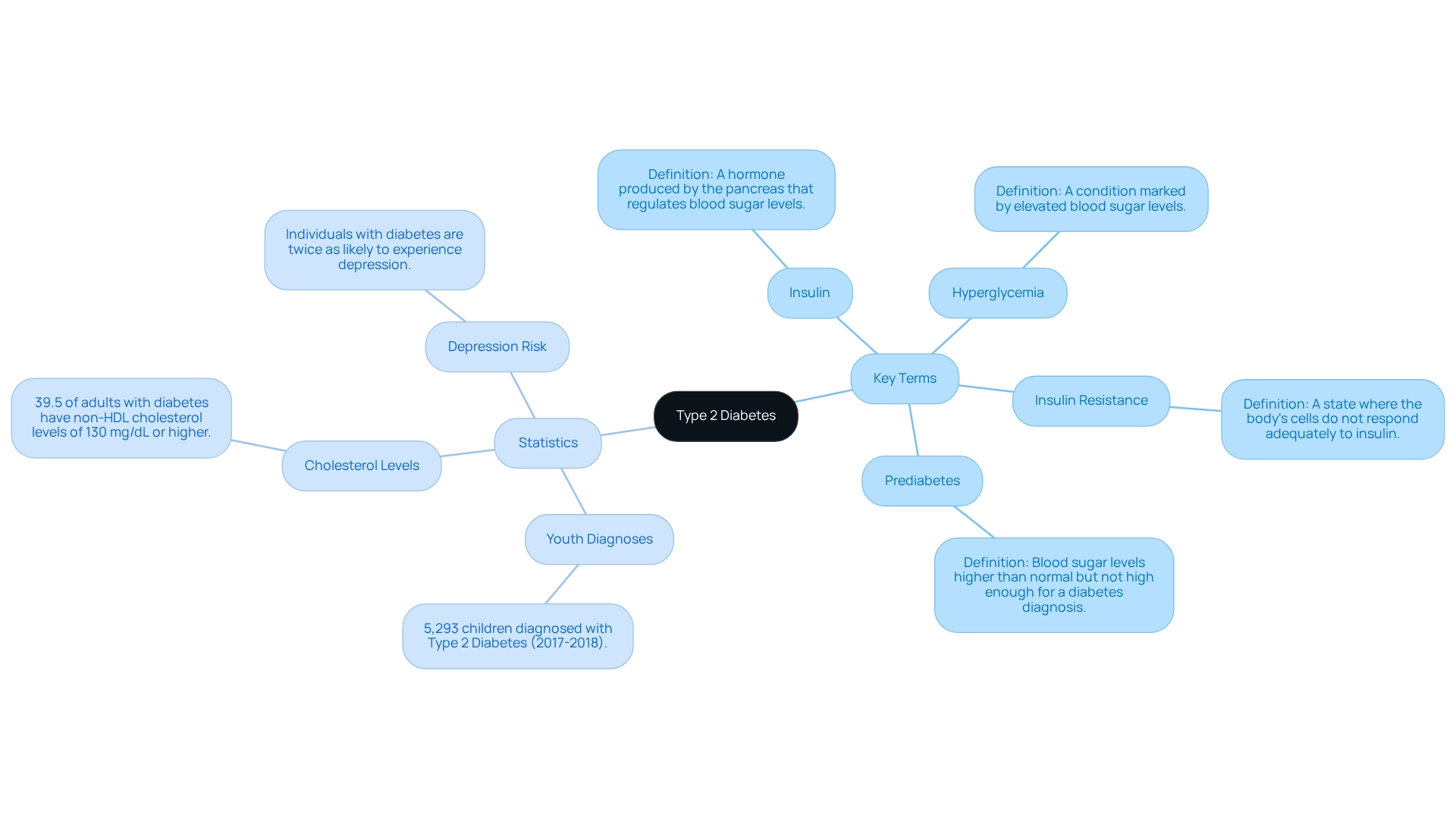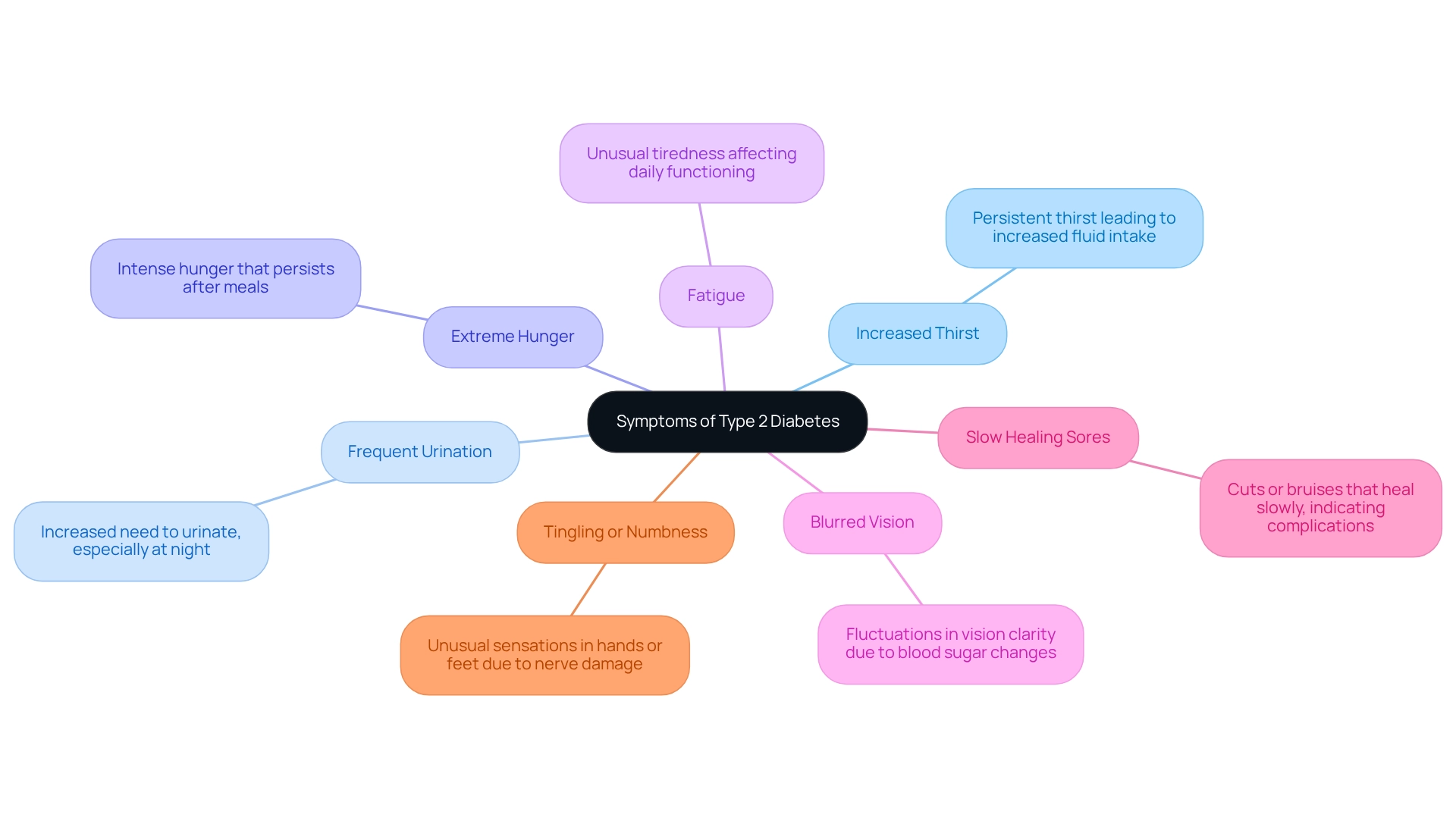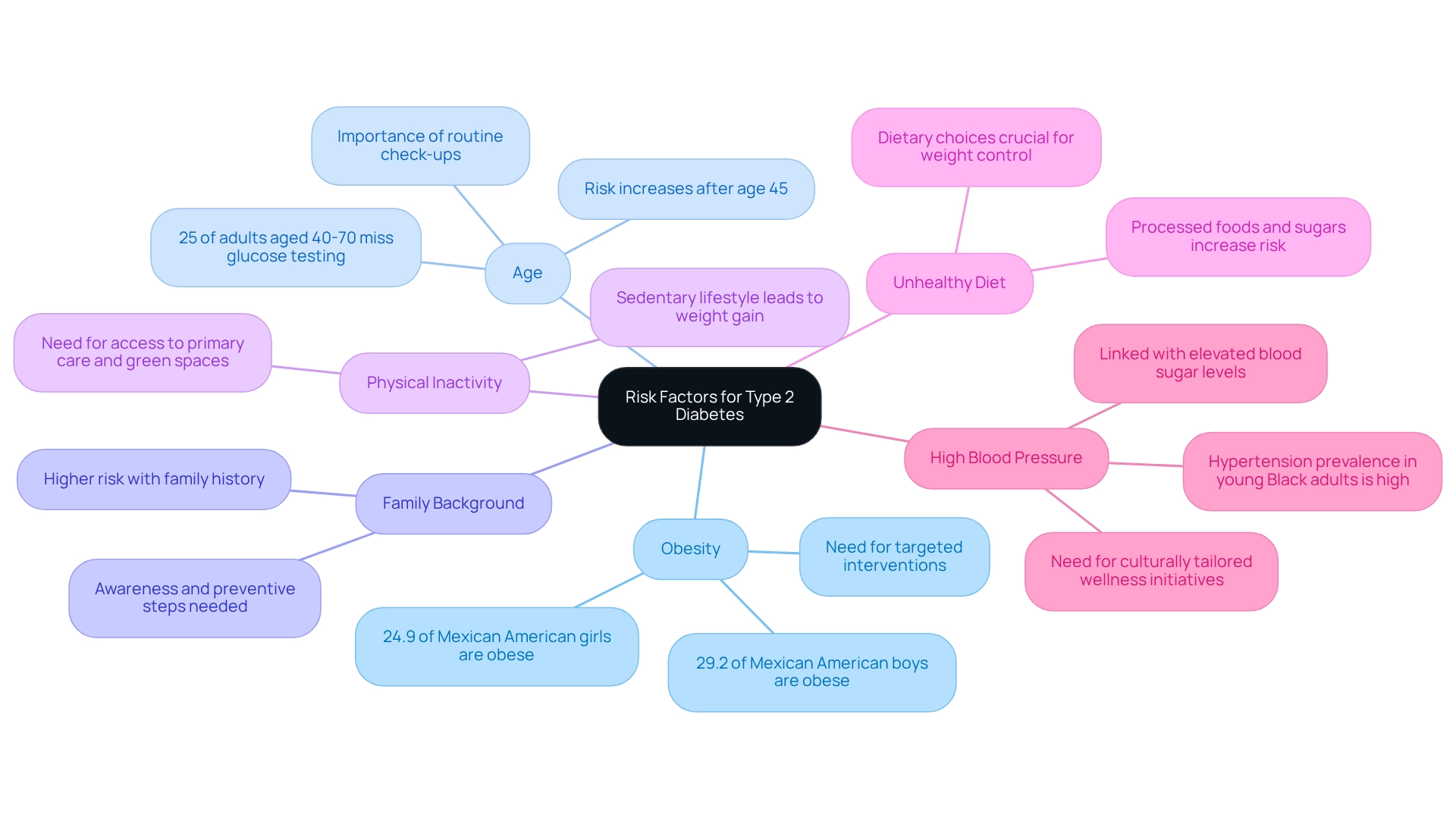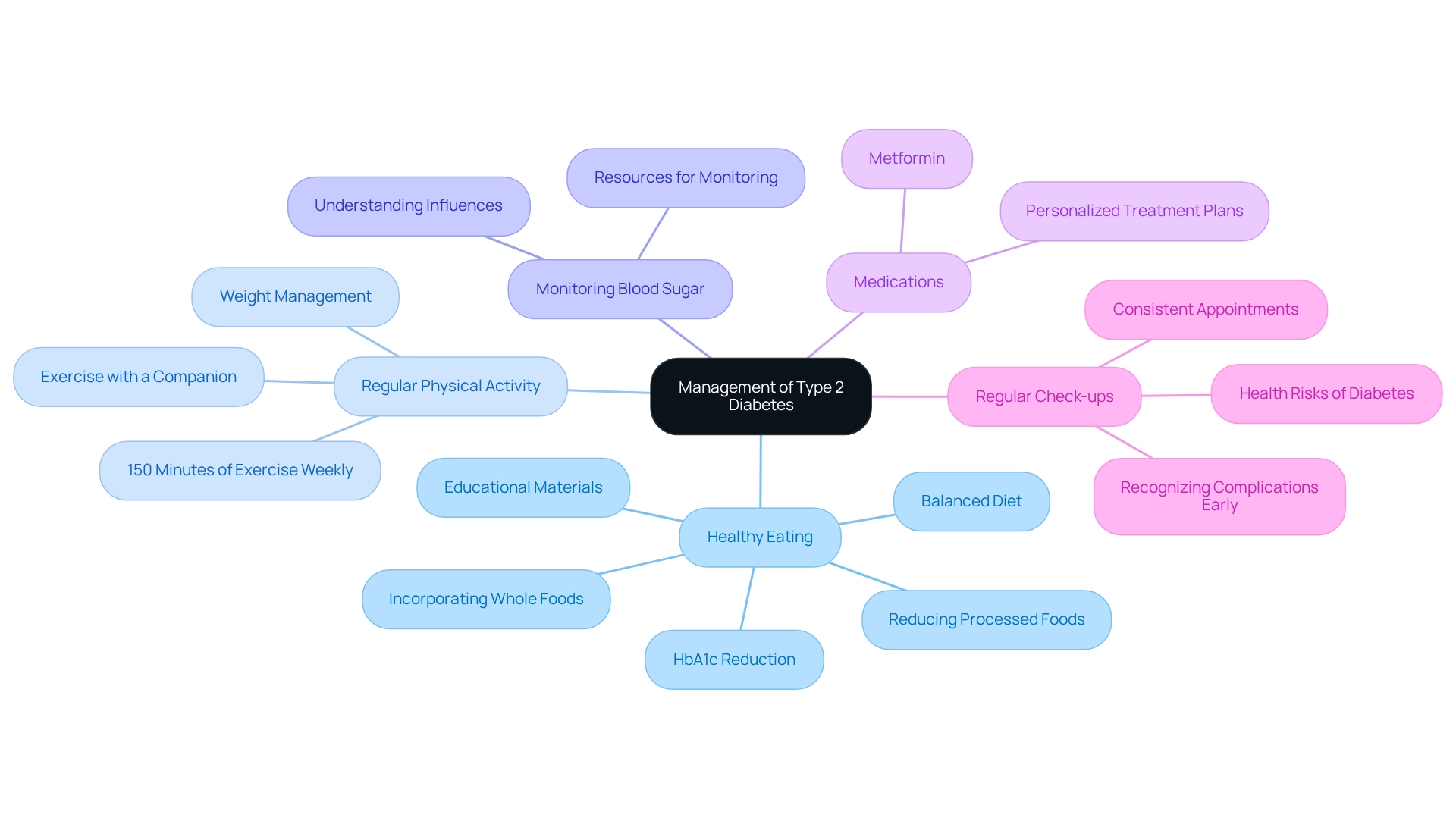Overview
Type 2 diabetes, often referred to as mellitus diabetes type 2, is a chronic condition that can feel overwhelming. It is characterized by insulin resistance or insufficient insulin production, which leads to elevated blood sugar levels and various health complications. Recognizing symptoms early is crucial, and understanding risk factors like obesity and age can empower you to take action.
It's understandable to feel concerned about managing this condition. Implementing strategies such as healthy eating and regular physical activity can significantly improve health outcomes and enhance your quality of life. Remember, you are not alone in this journey. Many people are navigating similar challenges, and there are resources available to support you.
By taking proactive steps, you can better manage your health and well-being. We are here to support you every step of the way, encouraging you to seek further information and connect with others who share your experiences.
Introduction
In the face of a rising global health crisis, Type 2 Diabetes has emerged as a significant concern, particularly among younger populations. This chronic condition, characterized by the body's inability to effectively manage glucose levels, poses serious health risks. It's understandable to feel overwhelmed by this diagnosis, and it requires a comprehensive understanding of its underlying concepts and symptoms.
As awareness grows, so does the urgency to address key risk factors and implement effective management strategies. With alarming statistics highlighting the prevalence of diabetes and its associated complications, individuals are encouraged to take proactive steps towards understanding and managing their health. Remember, you're not alone in this journey.
T2DSolutions stands at the forefront, offering valuable resources and community support to empower those navigating the complexities of Type 2 Diabetes. We are here to support you every step of the way, encouraging you to seek the information and assistance you need.
Define Type 2 Diabetes: Key Concepts and Terminology
At T2DSolutions, we are dedicated to supporting individuals newly diagnosed with Type 2 Diabetes, a chronic condition that disrupts the body's ability to metabolize sugar (glucose). This disorder arises when the body either becomes resistant to insulin's effects or fails to produce sufficient insulin to maintain normal glucose levels. Understanding key terms is crucial for effective management, particularly for conditions like mellitus diabetes type 2:
- Insulin: A hormone produced by the pancreas that plays a vital role in regulating blood sugar levels.
- Hyperglycemia: A condition marked by elevated blood sugar levels, which can lead to severe health complications if not properly managed.
- Insulin Resistance: A state in which the body's cells do not respond adequately to insulin, resulting in increased blood sugar levels.
- Prediabetes: A condition characterized by blood sugar levels that are higher than normal but not yet high enough to warrant a diagnosis of mellitus diabetes type 2.
It's understandable to feel concerned about the rising prevalence of mellitus diabetes type 2, especially among youth. In 2017-2018, around 5,293 children and adolescents were identified with Type 2, while a total of 18,169 were diagnosed with the condition (including Type 1). This reflects a significant increase from previous years, particularly pronounced among non-Hispanic Black and Asian or Pacific Islander populations.
Current developments in Type 2 Diabetes management emphasize the importance of addressing insulin resistance and hyperglycemia. Research highlights that nearly 39.5% of adults with the condition show non-HDL cholesterol levels of 130 mg/dL or higher, indicating an increased risk for cardiovascular disease. This underscores the significance of tracking cholesterol levels as part of thorough health management. Moreover, specialists observe that people with mellitus diabetes type 2 are twice as prone to face depression compared to those unaffected, emphasizing the necessity for comprehensive care that includes mental wellness assistance. At T2DSolutions, our goal is to empower you by offering resources and community assistance to navigate your journey with mellitus diabetes type 2. Understanding these concepts and the latest research on insulin resistance is essential for effective communication and management of your condition. By promoting understanding of these essential concepts and their consequences, you can more effectively manage your diabetes journey and make informed choices regarding your well-being. Remember, you're not alone in this journey; we are here to support you every step of the way.

Identify Symptoms: Recognizing the Signs of Type 2 Diabetes
Recognizing the signs of mellitus diabetes type 2 early is crucial for effective management and improved health outcomes. Common symptoms include:
- Increased Thirst: A persistent feeling of thirst that remains unquenched, often leading individuals to drink more fluids than usual. Many newly diagnosed patients report an overwhelming need to drink water throughout the day.
- Frequent Urination: An increased need to urinate, particularly noticeable at night, can disrupt sleep and daily activities. Patients often describe waking multiple times during the night to use the bathroom, impacting their rest.
- Extreme Hunger: A sensation of intense hunger that persists even after meals, indicating the body's struggle to utilize glucose effectively.
- Fatigue: Unusual tiredness or a lack of energy that can affect daily functioning and overall quality of life. Many individuals express feeling drained, even after a full night's sleep.
- Blurred Vision: Fluctuations in vision clarity may signal changes in blood sugar levels.
- Slow Healing Sores: Cuts or bruises that heal more slowly than anticipated can indicate potential complications associated with blood sugar issues.
- Tingling or Numbness: Unusual sensations in the hands or feet are often associated with nerve damage due to prolonged high blood sugar levels.
Recognizing these symptoms early is crucial, as timely diagnosis can significantly reduce the risk of complications. For instance, a study showed that 80.6% of adults with this condition also had high blood pressure, highlighting the necessity for unified care strategies that T2DSolutions promotes. Moreover, individuals with blood sugar issues are twice as prone to encounter depression, underscoring the significance of mental wellness assistance in managing blood sugar conditions. As Dr. Shamard Charles, a public wellness physician, notes, 'Prediabetes means you have higher-than-normal blood sugar (glucose), but it's not elevated enough to be classified as mellitus diabetes type 2.' By recognizing these indicators, you can seek medical guidance sooner, resulting in better wellness outcomes and enhanced quality of life. You're not alone in this journey, and we are here to support you every step of the way.

Explore Risk Factors: Understanding What Increases Your Chances
Several key risk factors significantly increase the likelihood of developing mellitus diabetes type 2, and understanding them can empower you on your health journey:
-
Obesity: Excess body fat, especially around the abdomen, is a primary risk factor. Current statistics reveal a strong correlation between obesity rates and the prevalence of Type 2 Diabetes. Alarmingly, over 29% of Mexican American boys and nearly 25% of girls are classified as obese. This highlights the urgent need for targeted interventions. We provide resources and guidance on healthy weight management strategies to help combat obesity, reminding you that you're not alone in this journey.
-
Age: The risk of developing Type 2 Diabetes escalates with age, particularly after 45 years. Recent studies show that adults aged 40 to 70 with overweight or obesity often do not receive adequate glucose testing, with at least 25% missing follow-up screenings. It's understandable to feel overwhelmed, but regular wellness examinations become increasingly significant as you age. Compounded risks, such as hypertension—which is more common in young Black adults—further emphasize the importance of routine check-ups. We are here to support you in managing your well-being as you grow older.
-
Family Background: If you have a family history of blood sugar issues, your risk may be higher. This underscores the importance of awareness and preventive steps for those with affected relatives. T2DSolutions can assist you in understanding your family background and its implications for your health, guiding you toward proactive measures.
-
Physical Inactivity: A sedentary lifestyle can lead to weight gain and insulin resistance, making regular exercise crucial for diabetes prevention. Greater access to primary care and green spaces for physical activity are essential in addressing health disparities. At T2DSolutions, we promote community activities and resources to encourage an active lifestyle, reminding you that every step counts.
-
Unhealthy Diet: Diets rich in processed foods and sugars can lead to obesity and elevate the risk of blood sugar issues. Nutritionists emphasize that your dietary choices play a crucial role in controlling weight and preventing blood sugar issues. T2DSolutions offers dietary resources and support to help you make healthier food choices, empowering you to take charge of your nutrition.
-
High Blood Pressure: Hypertension is often linked with elevated blood sugar levels, creating a compounded risk for those affected. The case study on hypertension rates in young Black adults highlights the necessity for targeted interventions to tackle these disparities. We provide information on managing blood pressure as part of diabetes care, ensuring you're informed and supported, particularly because certain ethnic groups, including African Americans, Hispanic Americans, and Native Americans, are at a higher risk of developing mellitus diabetes type 2. This disparity calls for culturally tailored wellness initiatives to enhance screening and treatment. Our organization is dedicated to offering culturally relevant resources to support these communities, fostering a sense of belonging.
Awareness of these factors is crucial for motivating lifestyle changes and ensuring regular health screenings. We encourage you to explore our website for more information on managing these risk factors and accessing community support. Together, we can empower you to take charge of your health.

Implement Management Strategies: Lifestyle Changes and Treatment Options
Managing mellitus diabetes type 2 can feel overwhelming, but you’re not alone on this journey. It requires a multifaceted approach that combines lifestyle modifications with medical interventions to effectively address mellitus diabetes type 2. Our organization is here to support you by providing valuable resources and fostering community engagement. Let's explore some key strategies together:
-
Healthy Eating: Emphasizing a balanced diet is essential. Focus on incorporating whole grains, fruits, vegetables, lean proteins, and healthy fats into your meals. Reducing processed foods and sugars is crucial for individuals with mellitus diabetes type 2 to maintain stable blood sugar levels. We provide educational materials to assist you in making informed dietary choices. Did you know that dietary changes can significantly improve blood sugar control? Some interventions have even led to a reduction in HbA1c levels by up to 1.5% for those with mellitus diabetes type 2. Real-world examples show how specific dietary interventions have successfully improved blood sugar control in various populations.
-
Regular Physical Activity: Aim for at least 150 minutes of moderate aerobic exercise each week, like brisk walking or cycling. Engaging in physical activity not only aids in weight management but also enhances insulin sensitivity. Remember, working out with a companion can boost your dedication to fitness plans, offering inspiration and accountability. As one expert wisely noted, "A successful exercise routine works into the demands of your day."
Weight management is important because even modest weight loss can lead to improved insulin sensitivity and better blood sugar control for those with mellitus diabetes type 2. Research indicates that losing just 5-10% of your body weight can have a considerable beneficial effect on managing blood sugar levels for those with mellitus diabetes type 2. We offer resources to help you monitor your progress and stay motivated.
Monitoring blood sugar is essential for understanding how various factors—such as diet, exercise, and medications—affect your mellitus diabetes type 2. We provide resources and advice to empower you to make educated choices regarding your well-being.
If lifestyle changes alone aren’t enough, medications like Metformin may be prescribed to help regulate blood sugar levels for individuals with mellitus diabetes type 2. The American Diabetes Association emphasizes the importance of personalized treatment plans that consider your individual health needs. T2DSolutions can assist you in navigating these options.
- Regular Check-ups: Consistent appointments with healthcare providers are vital for monitoring your blood sugar management and making necessary adjustments to your treatment plans. This proactive approach helps in recognizing potential complications early. It’s important to note that mellitus diabetes type 2 is a leading cause of new cases of blindness among adults aged 18-64 and was the eighth leading cause of death in the United States in 2021. T2DSolutions encourages you to prioritize regular check-ups and provides reminders and resources to help you stay on track.
By incorporating these strategies into your daily routine, you can effectively manage your condition and enhance your overall quality of life. The economic burden of diabetes is substantial, with the total cost in the United States reaching $412.9 billion in 2022. The prevalence among Hispanic, Latino, or Spanish adults ranges from 5.0% to 7.3%. This highlights the importance of effective management to mitigate both health and financial impacts. Remember, T2DSolutions is committed to being a valuable resource on this journey, and we are here to support you every step of the way.

Conclusion
Understanding Type 2 Diabetes is crucial for managing this chronic condition effectively. This article outlines key concepts, symptoms, and risk factors associated with Type 2 Diabetes, emphasizing the importance of early recognition and intervention. With a significant rise in prevalence, particularly among younger populations, being aware of the signs—such as increased thirst, fatigue, and slow healing sores—can lead to timely diagnosis and better health outcomes.
Moreover, it highlights various risk factors, including obesity, age, family history, and lifestyle choices, that contribute to the likelihood of developing Type 2 Diabetes. By fostering awareness of these factors, individuals are empowered to make informed decisions and take proactive steps toward their health. T2DSolutions provides essential resources and community support to help navigate these challenges, underscoring the need for regular health screenings and targeted interventions.
Implementing effective management strategies is vital in controlling blood sugar levels and improving overall health. Emphasizing a balanced diet, regular physical activity, and consistent monitoring can significantly enhance diabetes management. The integration of lifestyle changes with medical interventions, when necessary, is key to reducing the risk of complications and improving quality of life.
Ultimately, awareness, education, and community support play pivotal roles in managing Type 2 Diabetes. T2DSolutions stands ready to assist individuals on their journey, ensuring they have access to the information and resources needed to thrive. Taking charge of one’s health is not just a personal journey; it is a collective effort that can lead to substantial improvements for individuals and communities alike.
Frequently Asked Questions
What is Type 2 Diabetes?
Type 2 Diabetes is a chronic condition that disrupts the body's ability to metabolize sugar (glucose), arising when the body becomes resistant to insulin's effects or fails to produce sufficient insulin to maintain normal glucose levels.
What are some key terms related to Type 2 Diabetes?
Key terms include: - Insulin: A hormone produced by the pancreas that regulates blood sugar levels. - Hyperglycemia: A condition of elevated blood sugar levels that can lead to severe health complications if not managed. - Insulin Resistance: A state where the body's cells do not respond adequately to insulin, leading to increased blood sugar levels. - Prediabetes: A condition with blood sugar levels higher than normal but not high enough for a Type 2 Diabetes diagnosis.
What is the prevalence of Type 2 Diabetes among youth?
In 2017-2018, approximately 5,293 children and adolescents were identified with Type 2 Diabetes, contributing to a total of 18,169 diagnoses (including Type 1), reflecting a significant increase, particularly among non-Hispanic Black and Asian or Pacific Islander populations.
Why is it important to manage insulin resistance and hyperglycemia in Type 2 Diabetes?
Managing insulin resistance and hyperglycemia is crucial because nearly 39.5% of adults with Type 2 Diabetes have non-HDL cholesterol levels of 130 mg/dL or higher, indicating an increased risk for cardiovascular disease. Tracking cholesterol levels is an important aspect of health management.
How does Type 2 Diabetes affect mental health?
Individuals with Type 2 Diabetes are observed to be twice as prone to experience depression compared to those without the condition, highlighting the need for comprehensive care that includes mental wellness support.
How does T2DSolutions support individuals with Type 2 Diabetes?
T2DSolutions aims to empower individuals by providing resources and community assistance to help navigate their journey with Type 2 Diabetes. They emphasize the importance of understanding key concepts and the latest research for effective management and communication regarding the condition.



